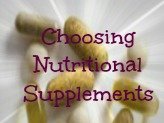Five Kinds of Nutrients I Should Eat Daily
There are five kinds of nutrients you should eat daily for proper functioning of your body. These nutrients are required in different specific amounts. Too much or too little may result to a nutrient deficiency disease or other serious conditions.
Why do We Need Food?
Food contains chemical substances called nutrients that, together with water, keep us alive and healthy. They also keep a child growing and developing from conception to adult life.
Food has other functions too: it satisfies hunger; it is often tasty and gives comfort and pleasure; it has traditional links with the past and may have medical and healing properties.
Nutrition is concerned with food in its health-giving, body-building function and therefore with the nutrients it contains. The body needs foods to be able to function and for daily growth and repair.
A child needs extra food to be able to build stronger and bigger body. A pregnant woman needs extra food for the growing fetus. A breastfeeding mother needs extra food for the production of milk.
A sick person needs extra food to be able to fight his disease and rebuild his body.
Different Kinds of Nutrients
There are basically seven different nutrients found in food, all of which, in differing amounts, the body needs for its different functions. These nutrients are:
1. Carbohydrates and fats: these provide the bulk of the energy or fuel the body needs for warmth, work and other functions. They are called energy nutrients.
2. Proteins: these are essential for growth, repair and resistance to diseases. They are called body building nutrients.
3. Vitamins and minerals: these are required in very small amounts to keep the skin and mucous membranes healthy as barriers against entry of diseases. This is why they are called protective nutrients. They are also needed for the proper working of many of the body’s growth and metabolic processes.
4. Fibre: this is composed of materials that is not usually digested by the intestines, thus it passes through the gut nearly unchanged. Its importance lies in keeping up the bulk of the contents of the intestinal track and binding them in the large intestine into a soft faecal mass that can be properly expelled.
5. Water: this is essential for the blood and other liquids as well as for the cells of the body.
The body needs these kinds of nutrients in balanced amounts. To obtain such balanced amounts, you need to eat a mixed diet of different foods containing the right amounts of nutrients.
It is helpful to divide foods into types used practically in the preparation of a meal and know how much of each nutrient they contain.








New! Comments
Have your say about what you just read! Leave me a comment in the box below.